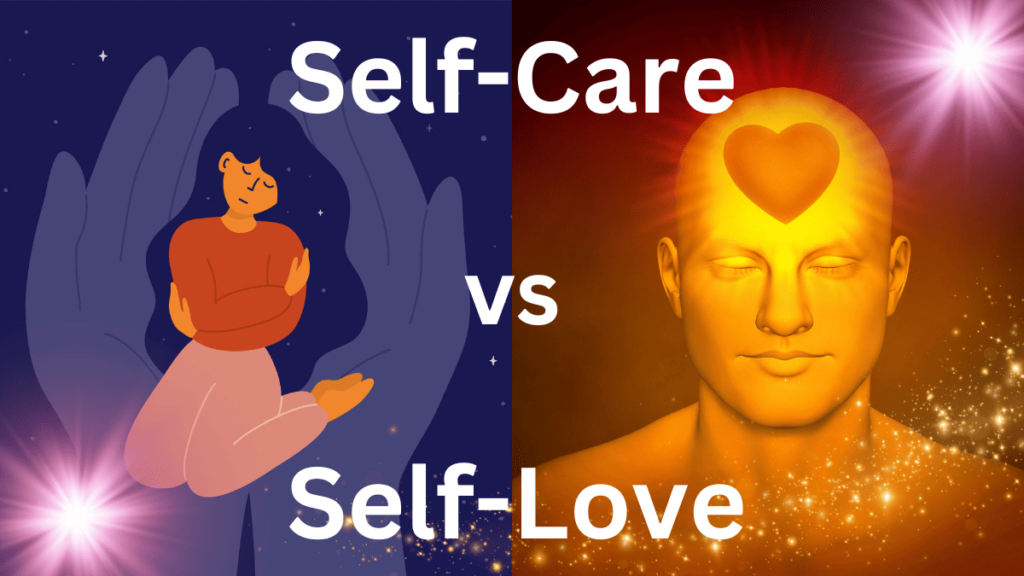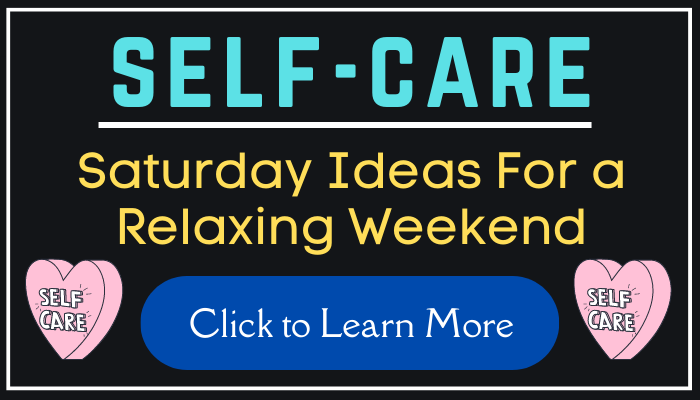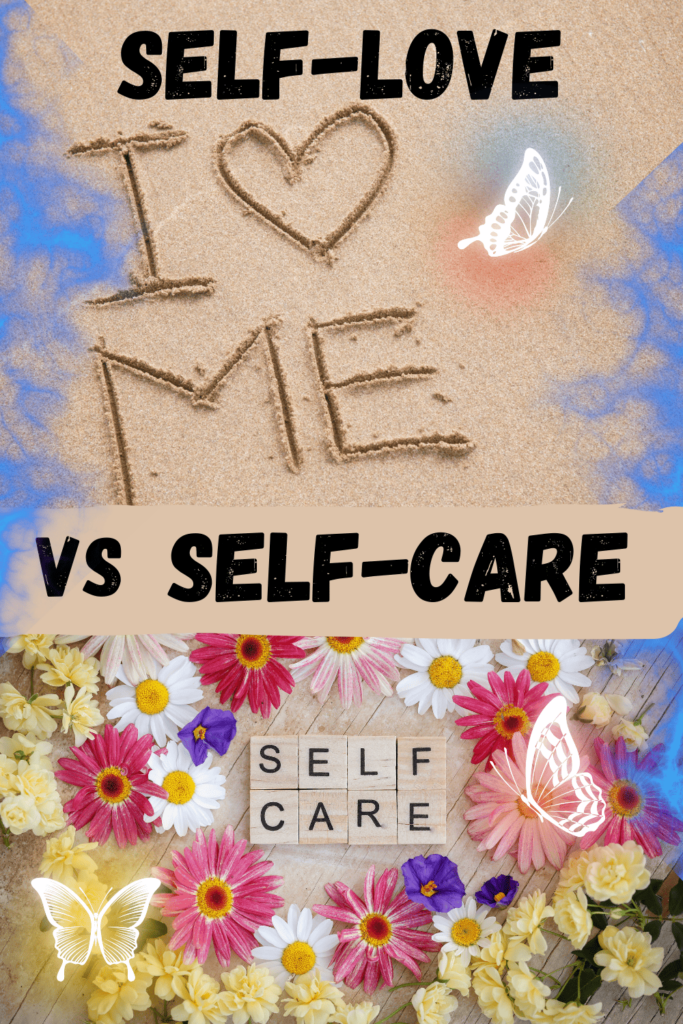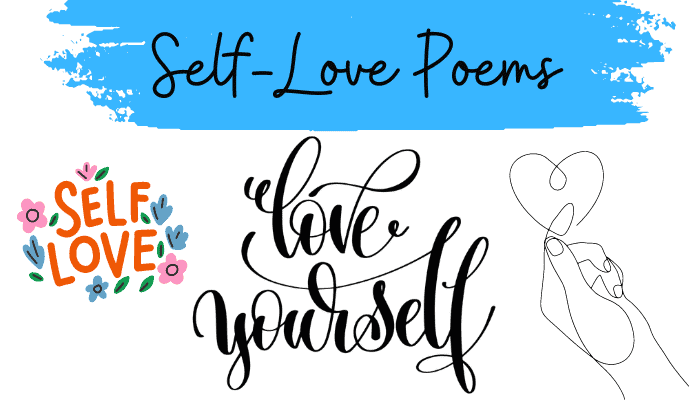Self-care refers to the concrete actions you take to support your well-being, while self-love involves the beliefs, attitudes and feelings you cultivate about your inherent value and worthiness of care. Self-care fuels self-love by proving through action that you matter, and self-love provides the mindset that motivates ongoing self-care.

You’ve probably heard these buzzwords thrown around a lot lately. But are they really the same thing? Or are there key differences between the two concepts?
This article will clarify the distinction between self-care and self-love. I’ll define what each term means, explain how they are related, and discuss why understanding the differences matters for your overall well-being.
While self-care and self-love support one another, they refer to distinct mindsets and practices. Grasping the nuances can help you integrate both more fully into your life. Read on to learn more!

Defining Self-Care
Self-care refers to the actions and practices you take to support your overall well-being. This includes caring for your physical, mental, and emotional health.
Self-care activities help you replenish your mind, body, and spirit. Examples of self-care include:
- Getting enough sleep each night
- Eating nutritious foods
- Exercising regularly
- Setting healthy boundaries
- Taking breaks throughout the day
- Practicing mindfulness or meditation
- Enjoying hobbies and leisure activities
- Spending time in nature or outdoors
- Reading books or listening to podcasts
- Journaling or reflecting
- Spending time with supportive friends and family
The key is that self-care requires you to take action to meet your needs. It’s about being proactive in caring for yourself.
For instance, you may know that exercising helps boost your mood and energy. So you make a point to go for a walk or hit the gym several times per week.
Self-care is any activity you deliberately choose to refresh and recharge yourself.
Don’t wait until you’re burned out or exhausted. Integrate small acts of self-care daily as a form of prevention.
Your mental and physical health will thank you!

Defining Self-Love
Self-love refers to the feelings, beliefs, and attitudes you have about yourself. It’s about the relationship you cultivate with yourself.
Self-love involves:
- Accepting yourself unconditionally
- Treating yourself with kindness and compassion
- Respecting your needs, desires, and values
- Believing you are worthy and deserving
- Honoring your boundaries and limits
- Forgiving yourself for mistakes
- Seeing your inner beauty and gifts
When you practice self-love, you make a commitment to care for and appreciate yourself. You value your well-being and needs.
For example, self-love means taking time to recharge when you’re tired, rather than criticizing yourself for not being productive enough.
Self-love provides a positive foundation that makes self-care activities more impactful.
And consistent self-care helps reinforce self-acceptance and care.
Make developing self-love a priority. Be gentle with yourself in the process.

Key Differences
Self-care and self-love may sound similar, but when you look closer there are some important distinctions between the two concepts.
Self-care refers to the concrete actions and practices you engage in to care for your physical, mental and emotional health.
Self-love on the other hand is more of an internal attitude, mindset and feeling you cultivate about yourself and your inherent worth.
In practical terms, self-care involves things you actively do to nourish yourself like getting enough sleep, setting healthy boundaries, making time for hobbies, and taking breaks.
Self-love is the lens through which you view yourself – it means speaking to yourself with kindness and accepting yourself unconditionally.
You could say self-care is the doing while self-love is the being. One involves behaviors while the other involves beliefs. Both are essential ingredients for well-being.
Consistency with self-care helps reinforce self-love by proving to yourself that you and your needs matter.
When you actively care for yourself, you start to believe you are worthy of care and respect.
Making self-care a habit leads to greater self-knowledge, self-acceptance and self-compassion.
Likewise, self-love provides the foundation that motivates ongoing self-care.
When you believe you matter and deserve to have your needs met, you are more likely to continue practices that nourish you rather than neglecting your well-being.
Self-love helps you value your health and make it a priority.
For example, someone who lacks self-love may rationalize not getting enough sleep because they don’t believe their needs are important.
However, someone who actively practices self-love would make sleep a priority knowing it’s crucial for their mind and body.
Self-love and self-care fuel one another in a positive cycle.
Self-love provides the motivation and mindset for regular self-care.
And consistent self-care reinforces a loving, caring mindset about yourself.
Integrating the two is the recipe for a fulfilling life!

Integrating Self-Care and Self-Love
The most powerful approach combines active self-care with core beliefs of self-love. Each supports the other in an upward spiral.
Make self-care more meaningful by infusing it with self-acceptance and compassion.
For example, approach exercise from a place of caring for your body rather than punishing yourself.
And meditate as a way to calm your mind, not force yourself to “be productive.”
Check that your self-talk matches your self-care. If you take yourself to the spa but then beat yourself up for “wasting” time and money – that reveals a misalignment.
Deeply accept that you deserve nurturing.
Also, balance action with reflection. As you earnestly care for yourself through healthy habits, also make time to examine your core beliefs.
Consider where you are still hard on yourself or minimizing your worth. Healing those thought patterns is key for genuine self-love.
Aim for self-care that makes you feel rejuvenated and empowered, not depleted.
Say no to “shoulds” that don’t serve you. Instead, let your self-care flow from a place of love – for the practice itself and for who it allows you to become.
Make self-love more than a lofty concept. Integrate self-acceptance thoroughly into your self-care routines.
Tweak your habits until they feel not like obligations but rather acts of love.

Final Words
Practicing self-care without self-love may feel empty, and self-love without self-care remains unmanifested.
Together, they form a synergy that not only enhances your mental, emotional, and physical well-being but also empowers you to navigate life’s challenges with grace and resilience.
As you continue your journey, remember that the acts of caring and loving yourself are essential, transformative, and non-negotiable.
Let this dynamic duo guide you towards a life of joy, peace, and contentment, where self-care routines are not mere chores but acts of love and self-love is not just a concept but a lived reality.
Frequently Asked Questions
What are some different types or components of self-love?
Four key components of self-love include unconditional self-acceptance, practicing self-compassion, respecting your own needs and values, and fostering a belief in your self-worth and capabilities.
Is prioritizing your needs a core part of self-care?
Yes, self-care absolutely involves putting your own well-being first and prioritizing meeting your own needs, as opposed to always caring for others while neglecting your health and happiness.
What are some steps or stages in developing greater self-love?
Key steps in cultivating self-love include getting to know yourself deeply, healing past wounds and trauma, practicing self-acceptance, meeting your own needs consistently, speaking kindly to yourself, forgiving yourself for imperfections, and embracing your uniqueness.
What’s the first and most essential step in building self-love?
The first and most crucial step to self-love is making a commitment to sincerely get to know, understand, and care for yourself - accepting yourself as you are while being devoted to your growth.
What are some foundational pillars for developing self-love?
Three foundational pillars for self-love are practicing daily self-care, embracing yourself with unconditional compassion, and living authentically in alignment with your core values and needs.
How can someone begin cultivating more self-love?
Develop self-love through consistent self-reflection to identify limiting beliefs, self-care to meet your needs, self-forgiveness to release shame, and embracing all aspects of yourself - including imperfections.
What is the connection between self-love and mental health?
Self-love is deeply connected to mental health, as lacking self-love and self-compassion is linked to conditions like anxiety, depression, and eating disorders. Nurturing self-love builds resilience against mental health struggles by promoting self-acceptance and a healthy self-relationship.
How can I practice self-love when I’m struggling with low self-esteem?
Focus on small, consistent acts of self-care and self-compassion to gradually build self-love - be patient and celebrate small wins. Seek professional support if needed. Affirm your strengths and keep perspective that you are worthy regardless of achievements.
How long does it take to truly develop self-love? Is it a lifelong process?
Self-love takes consistent effort over months and years - it's a lifelong process. Have patience and focus on progress over perfection. Self-love gets easier with practice but our self-relationship evolves throughout life.
How can I balance self-love with caring for others in my life?
Balancing self-love and caring for others requires establishing healthy boundaries, communicating your needs calmly but firmly, taking breaks to recharge, accepting help from others, and remembering that nurturing your own well-being enables you to be fully present and compassionate for people you care about.
You may also be interested in: 1. Self-Care Ideas For a Bad Day 2. Self-Love Journal Prompts



